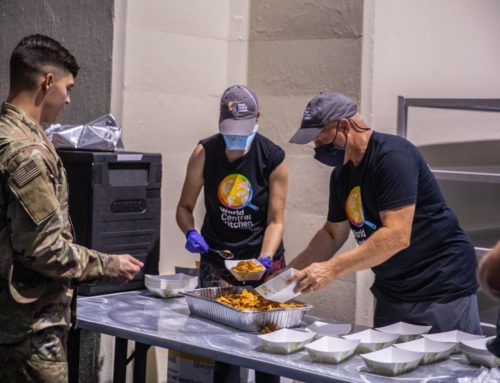Dear Friends,
I have said many times that race is this nation’s most traumatic issue. The events of the past week have laid bare the divisions we seek to heal and the consequences of systemic racism we seek to correct.
As I have noted many times before, we do not have a deficit of ideas in this country. We have had a deficit of courage.
It took until 2008 for the U.S. House of Representatives to pass a resolution apologizing for slavery. But a formal national apology has yet to occur. It has taken generations of police brutality to now be captured on camera for mass outrage to take hold on law enforcement’s aggressive use of force, specifically targeting black people. We still see Confederate flags and statues dotting the South and the country despite the past few years’ contentious debates.
Together, we mourn the death of George Floyd, yet another African-American begging for his life, for the ability to breathe. And we are reflecting.
People, particularly white people, continue to ask us what they can do.
What can you do?
The first thing is to listen. You should gain a greater appreciation for the generations and centuries of oppression that have created the outcomes we see today. And then to change, speak up and act. If we do not, we will continue to pay a price. We will continue to see this level of unrest until we act to address the roots of our division.
The truth is we all take our own journey on race. Included in this week’s newsletter are resources for learning compiled by our team–a collection of books, films, podcasts, plays, thinkers, and activists who help shape our thinking and challenge the status quo.
As people listen and learn more, and hopefully broaden their perspective, they must accept responsibility for changing. And change fast.
We can no longer wait to address our past, whether that be through formally debating the case for reparations or creating some other national reconciliation and healing process to repair generations of wrongs.
As Dr. King wrote in his letter from the Birmingham Jail in April of 1963: “This ‘Wait’ has almost always meant ‘Never.’”
The world has grown impatient for change. So change we must. We will continue to be divided until we do.
Only then can our country become what we have always promised to be: equal, free and one.
Mitch Landrieu
Founder and President
Reflections from the E Pluribus Unum Team
What have you learned from?
What has broadened your perspective?
What inspires you in this fight?
What has broadened your perspective?
What inspires you in this fight?
I think a lot of people don’t understand what privilege is or what systemic discrimination is until they do something that outright shows them how privileged they actually are. I believe that these privilege exercises are a good visual learning tool for people who don’t understand their privilege.
I knew Professor Butler was a figure I wanted to emulate after reading Chokehold: Policing Black Men. Butler uses his lived experiences (in Chicago) and legal expertise to eloquently unmask an unjust system that has disproportionately affected people of his community for decades. At E Pluribus Unum, I aspire to do the same within the racial equity realm.
As a history buff, I recommended this book to those who want to gain a real understanding of how deliberate government action, through racialized laws and policies, created a means for segregation to be maintained to this day. This book, along with other seminal works, builds the case for a fundamental change in not only how we learn about the past, but also how we commit ourselves to not repeat it.
I would encourage people to follow From Privilege to Progress which is the official Instagram for the #ShowUp movement which is a national effort to desegregate the conversation on race. It was created by the two women, Melissa DePino and Michelle Saahene, whose video of two Black men unjustly arrested in a Philly Starbucks went viral.
“The Mountaintop” written by Katori Hill offers a unique and imperfect picture of Dr. Martin Luther King Jr. on the night of his assassination. As someone who was taught a very positive, but superficial history of Dr. King’s work and legacy, this portrayal of him – one that is messy and inexplicably human – has been incredibly impactful to me and my work. The play leaves the audience with the sentiment “the baton passes on” – the work for equality, despite Dr. King’s death, continues on. Every day, but especially right now, I am called by this sentiment to do my part of making sure “the baton passes on” and I hope this play will inspire others to do the same.
I follow @clintsmithiii both for education given his intensive knowledge of history and for inspiration from his deeply moving poetry. He’s a fellow New Orleanian and Ben Franklin Falcon and I can always count on his work to offer a different perspective even on topics I think I understand.
My pick is The New Jim Crow. It lays out a clear and compelling case for the ways the justice system has been intentionally designed to oppress. Mass incarceration has everything to do with race and very little to do with justice.
Recent News & Commentary
City Lab: The Toxic Intersection of Racism and Public Space
Washington Post: Another unarmed black person has been killed. It’s no wonder we can’t breathe.
New York TImes: Congress Plans Hearings on Racial Violence and Use of Force by the Police
Huffington Post: The Shooting Of Black Americans Started Long Before The Looting
Slate: “When the Looting Starts, the Shooting Starts”
Ibram X. Kendi in The Atlantic: The American Nightmare
Trevor Noah on the connections of this past week’s events
Washington Post: This is why Colin Kaepernick took a knee
NPR Code Switch: A Decade Of Watching Black People Die
New York Times: Living Abroad Is My Way of Prolonging My Black Son’s Life



